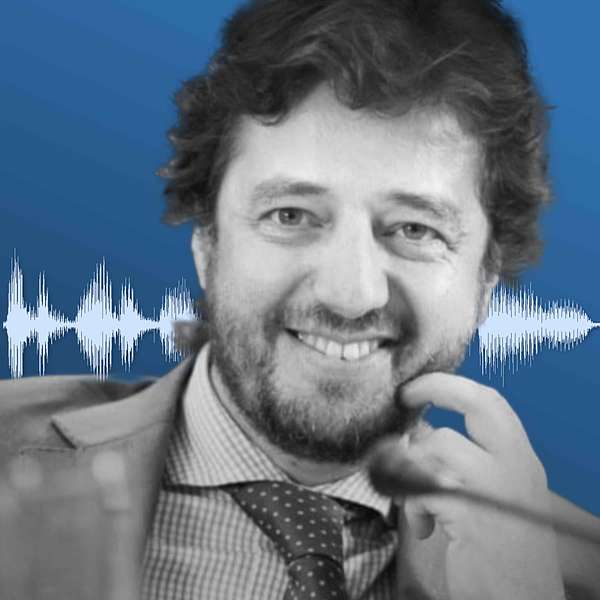
Europa Felix
Europa Felix is an interview podcast for European law professionals and enthusiasts. Listen every once in a while to an inspiring conversation with a rising star, hidden genius or luminary in the field of European law. In English or in Dutch. Follow the show in your favourite podcast app and get new episodes as they become available. You can find transcripts on www.europafelix.eu.
Europa Felix
Is the Superleague judgment a game changer? | Miguel Poiares Maduro
Use Left/Right to seek, Home/End to jump to start or end. Hold shift to jump forward or backward.
On 21 December, the Court of Justice of the European Union delivered three high profile rulings in the field of sports: Superleague, International Skating Union and Royal Antwerp Football Club. Earlier this year, I spoke to Miguel Poiares Maduro about EU law and sports. So I decided to call him up to ask if he could give us his take on these three recent judgments. Enjoy this bonus episode of Europa Felix!
Mentioned:
- Case C-333/21 European Superleague Company
- Case C-124/21 International Skating Union
- Case C-680/21 Royal Antwerp Football Club
- Judgment of the European Court of Human Rights (Third Section) in Semenya v Switzerland (11 July 2023)
With special thanks to Aurelia Leeuw.
Comments? Guest suggestions? Email me at felix@europafelix.eu
FELIX RONKES AGERBEEK: Welcome to this bonus episode of Europa Felix. Earlier this year I spoke to Miguel Poiares Maduro about EU law and sports. If you haven’t listened to that episode, it’s called “Can EU law save European football?” and it’s a conversation about sports, but also about how European integration can strengthen good governance and bring back democratic control to European citizens. Just a few days ago, on the 21st of December, the Court of Justice of the European Union handed down three high profile rulings about EU law and sports. The three cases are: the Superleague case, the International Skating Union case, and the Royal Antwerp Football Club case. I called Miguel up to ask if he could give us his take on these three judgments.
Miguel, welcome back!
MIGUEL POIARES MADURO: Yes thank you.
FELIX RONKES AGERBEEK: We’re going into extra time.
MIGUEL POIARES MADURO: Yes we are. An interesting extra time. And it may be a long extra time.
FELIX RONKES AGERBEEK: Last Thursday the Court of Justice gave rulings in three major sports cases. Let’s start with the one that attracted the most headlines and that’s of course the European Super League case. Are you happy with the judgment of the Court?
MIGUEL POIARES MADURO: Yes I’m happy with the ruling of the Court. It’s a balanced judgment where the Court, again, with respect to sports — let’s use this metaphor — kept its eyes on the ball. It was not diverted by side issues, but instead focused on what was really important, and I think decided on very solid grounds. That does not necessarily mean that I agree with all the details of the judgment, but overall I think it’s a very good judgment.
FELIX RONKES AGERBEEK: I would like to take you through a couple of early reactions to the judgment. The lawyers for the Superleague immediately characterised the judgment as a massive victory for the Superleague. How much of that is true? Did the Court open the door for the Superleague?
MIGUEL POIARES MADURO: It’s not true. And I think the Court was very clear, by the way, in the judgment in saying that the Court was not deciding if the Superleague should be authorised, or even if the Superleague is itself lawful with respect to EU law. What the Court was deciding on was on the powers that sports organisations — and in this concrete case UEFA — have in authorising competing sports events. And the extent to which the way UEFA has exercised those powers is incompatible with EU law. The case is not a vindication of the Superleague. It is a case that is critical of how UEFA has exercised its powers. That’s a different thing.
FELIX RONKES AGERBEEK: So the Court framed the powers of UEFA, without endorsing the Superleague.
MIGUEL POIARES MADURO: Yes. Exactly.
FELIX RONKES AGERBEEK: On the other end of the spectrum of reactions of the judgment, you have the reactions of UEFA and FIFA. UEFA issued a statement that said that the ruling was about a ‘pre-existing shortfall’ that has already been fixed. And the President of FIFA said: ‘This ruling doesn’t change anything.’ So UEFA and FIFA seem to shrug the ruling off as irrelevant. What do you make of that?
MIGUEL POIARES MADURO: Well, I think it’s understandable politically that they try to do that. But it’s wrong. The case basically recognises the specificity of sports and that this may lead to certain exceptions to competition rules, to internal market rules, including having at the top sports organisations, and recognising for these organisations a role both in regulating the sport, including in the licensing of sports competitions. But at the same time the ruling is very clear that, in order to be acceptable under EU law, they need to be subject to very strict requirements. To a framework on the exercise of their powers that must include both substantive rules and procedural rules that guarantee that that power is not going to be used in an arbitrary manner to favour their commercial interests, but instead is going to be used genuinely to pursue the regulatory objectives that authorised those exceptions. And that means that those rules, they must be non-discriminatory, transparent, objective, and subject to independent judicial review. And the Court develops these criteria further than it had done in the past, and in a way that, in my view, makes it very difficult to argue that the current rules of UEFA comply with that. But the second aspect that is problematic for UEFA and FIFA, and I think for other sports organisations, with respect to their role as commercial actors, is that the Court also makes clear that part of the non-discrimination-assessment of competing sports events is that they need to look into depth including into detailed economic data and other on the extent to which competing sports events that will be proposed are actually not better than the ones that these sports organisations are currently organising in terms of the objectives that are being pursued. That is: sports merits, equal opportunity of competition, some balance in the competition, the open character of these competitions, and solidarity and redistribution. So that’s the second challenge because the Court basically doesn’t open the door to the Superleague, but opens the door to other competitions so long as they are better than the Champions League in promoting sports merit, solidarity, and our open competitions. The Court says: yes you can be the ones authorising competing sports events, yes you can have your own sports events, your own competitions, but if someone comes up with a better model than your own, then that’s it. You have to accept that model instead of your own. And if you don’t do it, national courts have to impose that on sports organisations. And I think this is a game changer.
FELIX RONKES AGERBEEK: That’s a nice choice of words. In our previous discussion we talked about an inherent conflict of interest in sports governance bodies like [UEFA]. On the one hand, they regulate the sport and are the gatekeeper, authorising sports events and the participation of players and clubs. But on the other hand, they have commercial interests in the competitions that they themselves organise. It seems to me that one of the takeaways of the judgment is that, when you’re a sports governing body, the burden is really on you to demonstrate that you’re not conflating these two interests. You have to be able to prove that you didn’t take your own commercial interests into account when you’re looking at these authorisation requests.
MIGUEL POIARES MADURO: Yes. And I think the only way to guarantee that is by segregating those functions. It’s by having to have an independent body, that is not subject to influence from the commercial interests, deciding on the regulatory and licensing dimensions. That’s why I said that the initial reaction of UEFA and FIFA, of ‘this changes nothing because now we have this [recent] set of rules that we adopted’, that doesn’t fly. That’s not going to work. They will need to segregate clearly these functions. If they don’t segregate it clearly, then the decision-making procedure cannot be trusted to be non-discriminatory, objective and transparent.
FELIX RONKES AGERBEEK: Another important aspect of the ruling has to do with the exclusive commercial rights on sports competitions, like the Champions League. And this is of course where the money is generated for UEFA. What does the Court say about that? And how does it link to what we previously discussed about the European Model of Sports and about making sure that there’s a fair distribution of the income that is generated by the Champions League.
MIGUEL POIARES MADURO: I think there, there’s a novelty. The interesting thing in this judgment is that, while the Court accepts that monopoly of commercial rights, it at the same time makes a very strong link between accepting that and the distributive function. So that’s a monopoly that is accepted to the extent that it serves a redistributive function. I have my doubts that the Champions League currently fully serves that redistribution because normally it’s the clubs that are more wealthy and have more success that get more money. And the European Commission has never valued that aspect very much. But now it has to. And I don’t want you to comment on that, of course you cannot, but I’m interested in seeing if this will have consequences.
FELIX RONKES AGERBEEK: Okay. Let’s move on to an issue that came up in the International Skating Union case, and that is: the Court of Arbitration for Sport. And I want to make a little excursion to the European Court of Human Rights. Because, in our previous conversation, you mentioned that the European Court of Human Rights had been quite tolerant of CAS, the arbitration mechanism. But recently, that court has handed down a ruling that’s very critical of the CAS arbitration system, and also of the lack of oversight by the Swiss Courts. This was in the case of Caster Semenya, the Olympic medalist who had been told, by World Athletics, to take hormone treatments. Could you say something about that case?
MIGUEL POIARES MADURO: Yes, maybe they heard our conversation — I’m joking. Definitely the European Court of Human Rights in Semenya took a step further in challenging and in basically exposing the problems with the Court of Arbitration for Sport and with the review by the Swiss Supreme Court of the powers of the Court of Arbitration for Sport. And basically what the European Court of Human Rights said in Semenya, is that both CAS and the Swiss Supreme Court in reviewing CAS in that case, did not take sufficiently into account the rights of that athlete, and had not undertaken a form of judicial review that will guarantee enough protection of her fundamental rights.
FELIX RONKES AGERBEEK: If we go back now to the Court of Justice. In International Skating Union it also looks at CAS, but it looks at it from a different angle. Maybe just for context: that case was about the powers of the International Skating Union, the ISU, to prohibit professional skaters to participate in skating competitions that could compete with its own events. And the European Commission had found that the ISU had violated Article 101, competition law. And it has said that the CAS-system of arbitration reinforced that violation, because it made it more difficult to challenge the decisions of the ISU. Is that correct?
MIGUEL POIARES MADURO: Yes, it’s basically an aggravated circumstance in terms of restriction of competition. And that also limited the approach of what the Court could review, because moreover it was reviewing a judgment of the General Court that in turn was reviewing a decision of the European Commission. That makes it a little bit hard to draw clear lessons on what the Court is saying with respect to the Court of Arbitration for Sport. What the Court of Justice makes clear is that it believes that the way the CAS operates at the moment, and then its awards are reviewed by the Swiss Supreme Court, does not guarantee that EU law is effectively taken into account in those awards. And from this the Court seems to draw the consequence that therefore anyone challenging a decision of the sports organisations can do it in a national court.
FELIX RONKES AGERBEEK: A critical observer might say that this defeats the purpose of the CAS arbitration system. What if courts everywhere in the EU start questioning decisions of CAS on grounds of EU law. Doesn’t that put a bomb under the whole system of sports arbitration?
MIGUEL POIARES MADURO: Some people read the judgment as saying precisely that. As saying that you basically can circumvent the sports arbitration system. On the other hand, the question is left open whether that same role could be performed without totally putting into question the CAS arbitration system if for example a national court would say: well I will always review the EU law questions in order to guarantee the effective protection granted by EU law, but I will do it only after the CAS decision. Many national courts have not taken that seriously and many national courts have basically said: well, there’s a CAS arbitration award, first I wait for the decision and second, once they decide, I don’t get into it, I simply enforce it. The Court makes it very clear that at a minimum they need at the level of the enforcement to go into depth into the review of the EU law questions.
FELIX RONKES AGERBEEK: Alright. There’s one more case that came out on the 21st of December, and that’s the Royal Antwerp case. That’s again a football case and it’s about UEFA’s requirement that clubs should have a minimum of 8 “home grown players” on the squad — and that is to say players that have been trained in the national league. What do you think is the main takeaway from that judgment?
MIGUEL POIARES MADURO: I think the crucial aspect, and the Court hints at that very strongly, is that the Court says: it’s justified to have restrictions of competition and free movement for the purpose of promoting the training of young players, but the rule in question was a rule that did not reward individual clubs that invested in young players, but instead imposed a minimum number of home grown [players] at the national level. So if a club did not invest at all in young players, did not invest at all in an academy for training players, but had enough money to then go and buy it from another football club, so long as it was from the same country, then that was accepted by this rule. And what the Court highlights is that then, what this rule does, is to discriminate on the basis of nationality instead of actually being genuinely supportive of the training of young players. If you want to support young players then you can have a rule that says that any club needs to play with five players that have been grown at their own academies, at the academy of that club. It’s a very good example of the Court of Justice being very pedagogical of, on the one hand saying, yes, again, we recognise the specificity of sports and that this may justify certain restriction, but second, you need to be serious, consistent in how these rules actually are appropriate and necessary for the pursuit of these specific interests that we recognise may justify certain restrictions to competition or free movement.
FELIX RONKES AGERBEEK: Okay, that’s very clear. So one last question before we go to our respective Christmas celebrations. Do you have higher hopes now that EU law will save European sports?
MIGUEL POIARES MADURO: I think that these three judgments were three very important steps in the direction of EU law helping to save sports. They clearly recognise the unique, special character of sports, but at the same time make it clear that that special character is only acceptable to the extent to which sports organisations comply with principles of good governance and forms of democratic accountability. Now, the Court creates the framework for that. The Court empowers national courts to do that. Of course, there are risks of fragmentation once this role is to be played by courts. And this is the lesson that I hope the political process at EU level also takes from this. It is that they realise that in order for the very positive steps that the Court has taken to be fully effective, it is important for the regulation of sports to be complemented at EU level by a public framework that, on the one hand, protects the powers of sports organisations, protects the pyramid model of sports, but at the same time subjects them to certain forms of public supervision, public accountability, public scrutiny. I hope that ultimately that will be the outcome that will come from these cases.
FELIX RONKES AGERBEEK: Miguel, thank you so much for taking the time to talk again to me about this topic.
MIGUEL POIARES MADURO: Thank you so much for inviting me.
FELIX RONKES AGERBEEK: I wish you very happy holidays.
Podcasts we love
Check out these other fine podcasts recommended by us, not an algorithm.

Café Europa
Haagsch College
The EU Law Live Conversation Series
EU Law Live
Waarom Europa?
involvEU
.jpeg)